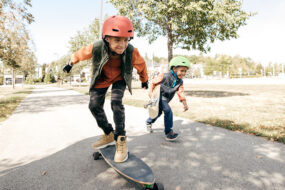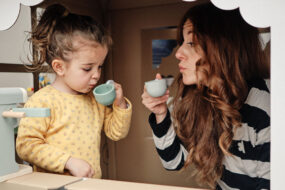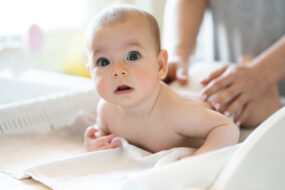Kids and concussion: What all parents should know
One in five kids experiences concussion – so how can you spot the signs of a head knock, and what should you do next?
Rough and tumble – whether through sport or play – is part of a healthy childhood journey.
But rigorous play does carry a risk of injury, ranging from a few scrapes and bruises to something more serious.
Concussion, usually the result of a knock to the head, is a reasonably common childhood injury, with one in five kids experiencing one by the age of 10.
In younger kids, concussion is usually caused by a fall, while in older kids it mostly occurs while playing sport such as footy, rugby or soccer.
“Concussion is the mildest form of a head knock,” Murdoch Children’s Research Institute theme director Professor Vicki Anderson says.
“One of the components of the definition of concussion is you can’t see any abnormalities on a clinical brain scan, it’s not necessarily causing significant brain injury.
“But it’s serious, because if it’s not identified and treated early, kids can have ongoing symptoms.”
In a recent study, Prof Anderson and fellow researchers found up to 36.7 per cent of kids experienced mental health issues such as depression and post-traumatic stress after a concussion, while 20 per cent experienced problems with aggression and attention.
- Growing up: 7 types of play that are awesome for kids
The link between concussion and mental health conditions
According to the research, having a pre-existing mental health problem was the strongest indicator of post-concussion mental health issues (29 per cent). But 26 per cent of kids without previous mental health concerns went on to develop symptoms.
“Literature tells us females are more vulnerable (to post-concussion mental health issues), adolescents are more vulnerable, (especially) adolescents that have a more anxious temperament, or kids that are really high achievers,” Prof Anderson says.
Prof Anderson says early identification of mental health difficulties should become part of standard concussion management.
“Mental health problems tend not to rear their head until after the physical problems are sorted,” she says.
“If there’s not really early treatment and management of their concussion… if they sit around for days not able to be involved in any activity, worrying what the consequences are going to be, it seems to be a risk factor (for post-concussion mental health problems).”
- Mental check: Why are kids getting so anxious?
How to spot common signs of concussion
It’s important to look for signs of concussion even if there was no obvious knock to the head, Kidsafe Victoria general manager Jason Chambers says.
“A concussion can occur when there is impact anywhere on the body that causes the head to shake or twist,” he says.
The new HeadCheck app, developed by MCRI and The Royal Children’s Hospital, may help care-givers recognise a concussion and respond.
“Parents or coaches can put in the immediate symptoms they’re seeing after a child has had a head knock, and it can help identify the level of severity and how to respond – call an ambulance, go to the GP – but for most kids it’s just watch the child, and if they have any additional symptoms or they get worse then they need to go to hospital,” Prof Anderson says.
Signs and symptoms of a concussion include:
- Dazed appearance
- Headache
- Nausea/vomiting
- Unsteady feet/dizziness
- Altered consciousness
- Confusion
- Incorrect responses to questions (i.e. memory loss)
- Clutching head
- Slow movements
- Sensitivity to bright lights and loud noises
- Difficulty concentrating
- Feeling foggy, slow or “not quite right”
Can concussion be prevented? Do helmets help?
Experts say other than in specific sports such as cricket or cycling, helmets may not be practical for general use.
“There is no definitive evidence that helmets prevent concussion,” Jason says.
Prof Anderson says helmets may even do more harm than good.
“Physiologically, kids’ heads are relatively big on their bodies so it’s a big weight on there, and by putting a helmet on their head, you increases the risk of a neck injury,” she says.
“A lot of literature tells us if you put a helmet on a child they will feel they’re invincible and may go out and do things that are a bit risky.”
While a lot of focus has been put on reducing the incidence of concussion in organised sport, Prof Anderson says some injuries are inevitable.
“I don’t like the idea of wrapping kids up in cotton wool,” she says.
“If they’re not playing sport and getting out and getting active, they’re sitting on screens or they’re doing nothing and getting obese and having other health problems. I think it’s a matter of balance.”
- Play safe: How to prevent dental injuries in kids
Written by Claire Burke.





